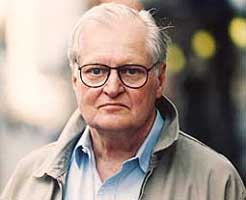John Ashbery at 80
John Ashbery will be turning 80 next year. He’s been publishing books of poetry for over 50 years, with plenty of champions and detractors. As for me, I find his poetry persuasive. It enacts what I suppose might be called the “democratization of difficulty.” Which is, the Modernists (whom I also, by and large, like very much, yippie for me!) wrote difficult poems (we’re told), and readers often had the feeling that they, the readers, just weren't smart enough to catch all the allusions, etc., but if they were, it would benefit the reading of the poem, and make it all resolve (I’m still waiting for a good explanation of this, by the way). Well, Ashbery has changed all that. His difficulty is open to everyone. There is no book to which he's referring (or, as is often the case, he IS alluding to something, but if you catch the allusion it’s as helpful as finding out which magazine Richard Hamilton found his objects to cut out) . . . it's all fishing in the day, its imagination and anxiety. I’m thinking, today, of his work as the poetic equivalent of say Jasper Johns or Claes Oldenburg. Or the aforementioned Richard Hamilton.
He's creating a complex, inexplicable tone in his poems, and moments of high clarity (clarity of his purpose, and his human world view) amid the evasions (or perhaps, amid the inclusions). In a similar way that much of Pop Art existed in a de-re-contextualized space of neutral (celebratory? satirical?) engagement. Cool, they called it.
Anyway, I’ll be thinking a lot more on this as I’m trying to organize my Ashbery thinking. So here’s one of the poems from his most recent book, Where Shall I Wander.
Ignorance of the Law Is No Excuse
We were warned about spiders, and the occasional famine.
We drove downtown to see our neighbors. None of them were home.
We nestled in yards the municipality had created,
reminisced about other, different places —
but were they? Hadn’t we known it all before?
In vineyards where the bee’s hymn drowns the monotony,
we slept for peace, joining in the great run.
He came up to me.
It was all as it had been,
except for the weight of the present,
that scuttled the pact we made with heaven.
In truth there was no cause for rejoicing,
nor need to turn around, either.
We were lost just by standing,
listening to the hum of wires overhead.
We mourned that meritocracy which, wildly vibrant,
had kept food on the table and milk in the glass.
In skid-row, slapdash style
we walked back to the original rock crystal he had become,
all concern, all fears for us.
We went down gently
to the bottom-most step. There you can grieve and breathe,
rinse your possessions in the chilly spring.
Only beware the bears and wolves that frequent it
and the shadow that comes when you expect dawn.


0 Comments:
Post a Comment
<< Home